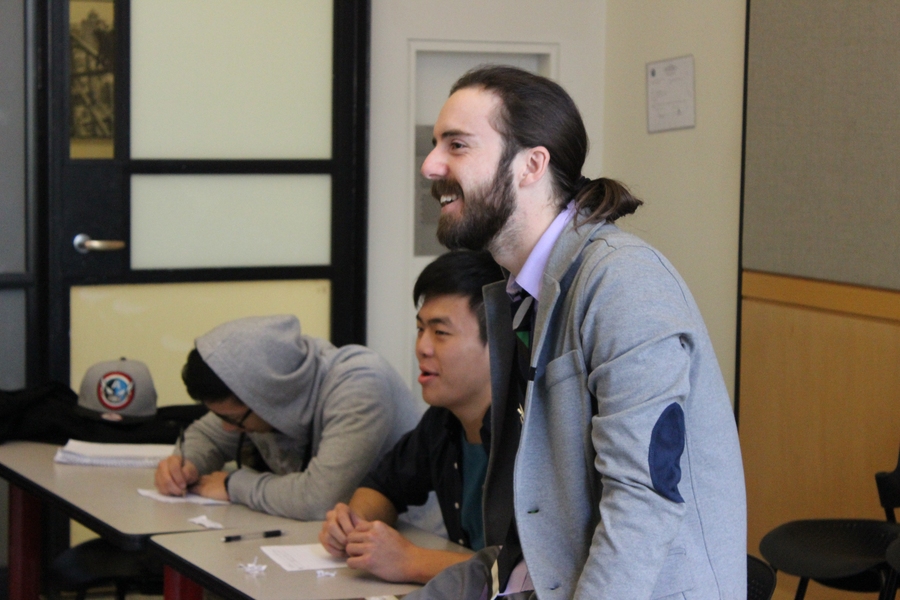For the nearly 100 high school students from Boston, Cambridge, and Lawrence, Massachusetts, in Saturday Engineering Enrichment and Discovery (SEED) Academy — an academic-year science and engineering program at MIT — most classes pose questions that demand precise answers. One course, called Life Mastery, asks students to abandon concrete answers and enter the classroom with open minds and room for abstract thinking.
Because high school is a time for change and development, instructors tailor Life Mastery for each grade level. In ninth grade, students learn how to manage their time, study effectively, handle peer pressure and challenge stereotypes. Sophomores explore their identities in relation to the greater global community. Juniors develop their professional skills and discuss the effects of bullying and stereotypes. In the final year of Life Mastery, students participate in workshops on writing college essays and resumes as well as preparing for college admissions interviews.
Tapping into meaning
One Saturday morning, an 11th-grade class discussed Simon Sinek’s “Start With Why” theory. “Everything we do, we believe in challenging the status quo,” says Sinek, quoting a marketing message from Apple Inc. “We believe in thinking differently.” This approach proves to be more successful than explaining what a company does and how it works. Starting with “why” exposes the targeted audience to a more effective emotional appeal.
“Great leaders think inside out,” said Life Mastery instructor Jacqueline Nkuebe.
Thinking back on her high-school experience, Nkuebe recalled her teachers and counselors failing to provide the guidance she needed. “Sometimes the people we think will be champions are not, and I want to be these kids’ champions,” says Nkuebe.
She aims to form lasting bonds with the students in her Life Mastery courses and share wisdom from years of working in policy research and health care. She gives her students the important advice she wished someone introduced to her in high school. “I have a chance to build these relationships,” says Nkuebe. “I am in their corner.”
Life Mastery co-instructor Ryan Marnane is a doctoral candidate and adjunct instructor of humanities at Salve Regina University, in Newport, Rhode Island. He feels at home teaching Life Mastery to students in SEED Academy. Marnane also instructs the Humanities course for rising high school seniors of Minority Introduction to Science and Engineering (MITES), a six-week residential summer program at MIT.
“This is how I tap into meaning,” says Marnane. Life Mastery allows him to guide students through teaching about literature, philosophy, ethics and life skills. In return, students give him insight into their lives and teach him lessons he couldn’t learn anywhere else.
“It’s an active dialogue, as opposed to a passive reception of information in this class — a comparative participatory dialogue of communion, presence, and wonder,” he says.
A safe space
Life Mastery emphasizes the possibilities that open up when approaching certain questions with objectivity. One of the goals of the course, according to Marnane, is to help students feel comfortable in a “safe space of not knowing” and acclimate themselves to seeking a variety of solutions.
The idea of Life Mastery is to challenge students to think unconventionally and develop freer thought processes. “The course makes me think in a new way, and we discuss current issues and topics going on in the world around us,” said one 11th-grade SEED student.
“It was a really great bonding experience with my fellow SEED peers,” said one 12th-grade student. “I felt that I've gotten to know everybody on a much deeper level and I truly enjoyed that.”
Through the course, Life Mastery instructors hope that students leave with the confidence and knowledge to live as “active participants in the global community.” By asking broader questions, Life Mastery is a catalyst in helping students decide courses of action for the future.
“Students inspire me,” says Nkuebe. “They encourage me to reflect on where I have been, where I am, and where I hope to be, as well as the people I hope to support along the way.”








